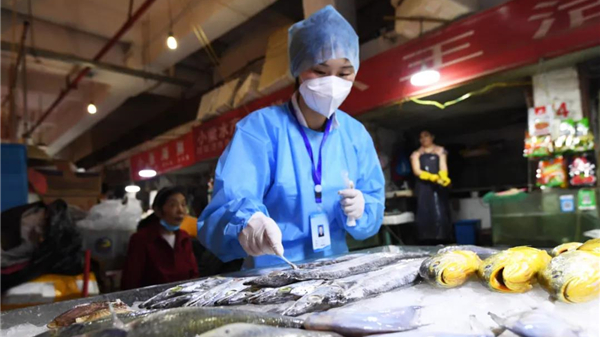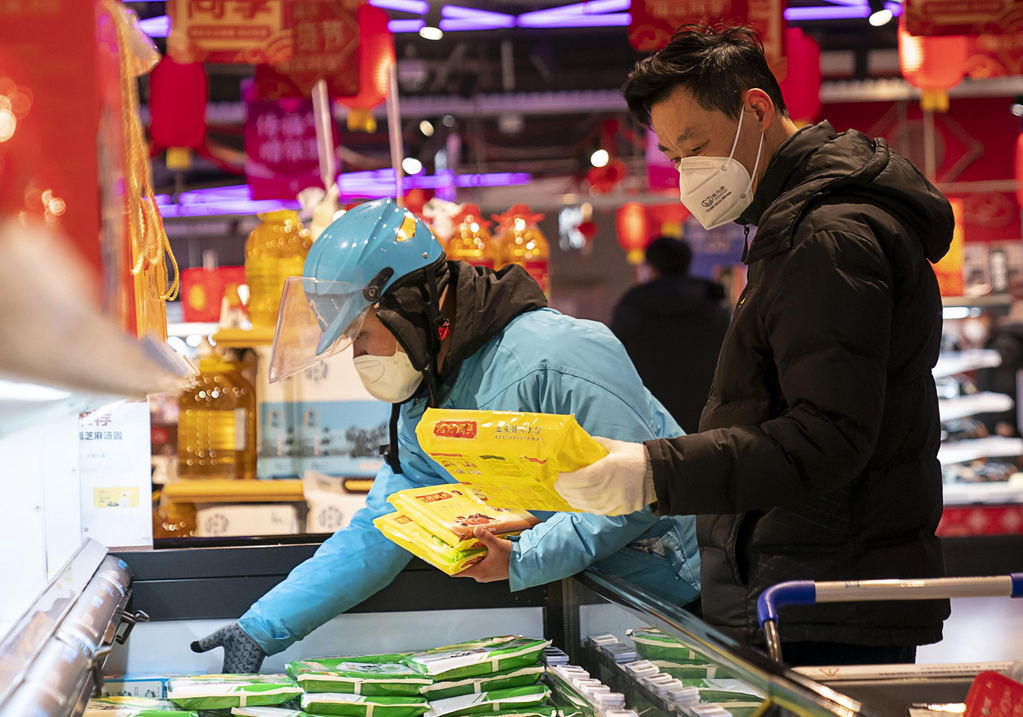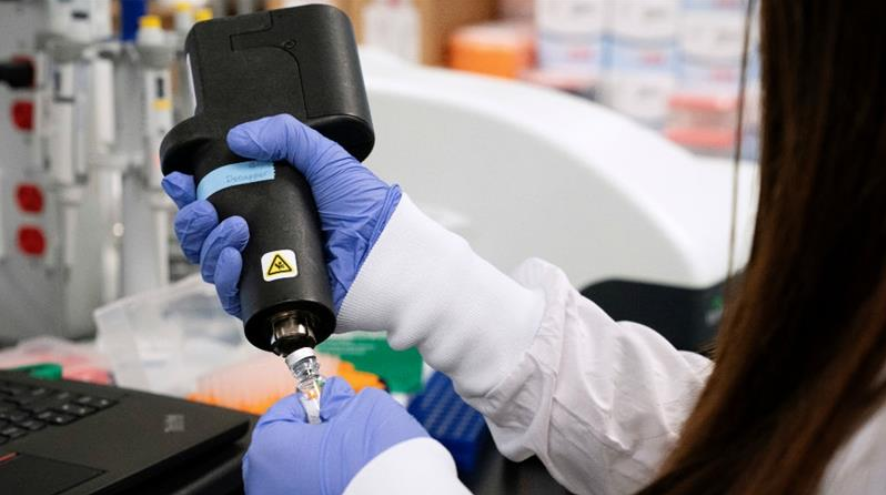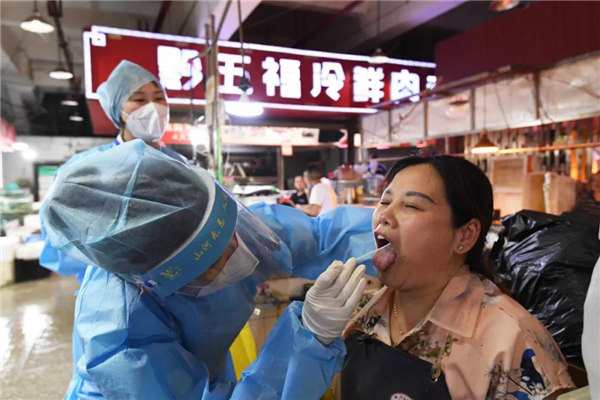
A Health worker screens frozen fish for coronavirus at a food market. /Xinhua
A Health worker screens frozen fish for coronavirus at a food market. /Xinhua
On Saturday, Hema, a Chinese fresh items supermarket chain owned by Alibaba, announced it had suspended operations of all its branches in South China's Shenzhen, a decision taken a day after one of its salespersons was reported to have contracted the coronavirus when she was on duty.
This is yet another case that has revived the discourse on how low-temperature storage can prolong the virus' survival on the surface of meats and packaging. While there have been growing calls for the boycott of frozen food, experts say they may not be warranted.
Similar incidents that have scattered around the world are raising concerns over the role that global supply chains have played in facilitating the transmission of coronavirus. New Zealand has recently seen an outbreak that local officials believe was not triggered by local transmissions but possibly caused by imported freight in a cool store.
While most viruses cannot survive in a high-temperature environment, they are resistant to cold, said Li Jianguo, deputy director of the Department of Infectious Diseases of the Zhongshan Third Hospital.
As for the coronavirus, studies have shown that it may survive for about 3 hours at room temperature, while below 20 degrees Celsius, the survival time may span as long as a week, and below zero degrees Celsius, it could be stretched to several months.
This is particularly concerning to people in China, as repeated detections of the virus on imported frozen meats and their packaging are increasingly scaring off frozen food consumers. This week alone, the country has reported at least three other such incidents.

A deliveryman collects frozen food at a store. /Xinhua
A deliveryman collects frozen food at a store. /Xinhua
"Although the virus cannot replicate itself in a cold environment, its biological structure is not damaged, and once the virus is transferred somewhere else, it may be able to make mass replicas," Li said.
What causes more headaches is the strong "stickiness" of the coronavirus, as studies also show that it is prone to linger on smooth surfaces, making the plastic outer packaging of imported food an inhabitable place for the virus.
While the number of such incidents has risen to an alarming rate in China, experts say boycotting frozen food is like avoiding food consumption for fear of choking.
Health experts concur that a person could spread droplets containing the virus on the surface of the food or a package, and someone else could then contract the virus by touching the surface and then their mouth or nose, but they said such a case is rare.
Infection from contact with a frozen virus through imported food "is still not to be considered a major route of infection and still not an event that should substantially affect policy at the public health levels", said Dr. Eyal Leshem, director of the Centre for Travel Medicine and Tropical Diseases at Sheba Medical Centre in Israel.

Scientists across the world are studying the coronavirus. /Reuters
Scientists across the world are studying the coronavirus. /Reuters
"The number of virus particles coming out a person's mouth or nose is far greater than a few virus particles remaining on frozen foods, somebody touching it and then spreading it," said Dr. T. Jacob John, a retired professor of clinical virology at Christian Medical College, Vellore, India. "Among all the risks, I think these are very low risks."
Despite China's continued discoveries of the virus on imported frozen food and packaging, local authorities' thorough COVID-19 testing of personnel on site have also indicated that the virus on those surfaces did not make its way to the human.
Li also echoed John's remarks. He has recommended procedures to minimize the risk of contracting the virus.
"In the process of transporting frozen food, staffers should take adequate protective measures: Wearing masks and gloves and disinfecting the surface of the gloves. If their masks fell off, they should replace it with a new one. Once gloves are taken off, they should also get a new glove," he said.
"As for consumers, they should remember to wear a mask when shopping in the supermarket, and when it comes to selecting frozen foods, they should lower the frequency of touching them and wash hands after picking them out."
Experts and officials also say there is currently no evidence that people can catch Covid-19 from food or food packaging.
Li Ning, deputy director and researcher of the National Center for Food Safety Risk Assessment, told reporters that China and other countries had not seen reports of confirmed cases caused by food consumption.

A Health worker tests people for coronavirus at a food market. /Xinhua
A Health worker tests people for coronavirus at a food market. /Xinhua
Since the new coronavirus cannot replicate on the surface of food or packaging, it can only become gradually weaker outside a living cell, said Dr. Jin Dong-Yan, a virology professor at the University of Hong Kong.
Guangdong Province introduces safety regulations
On top of China's routine screenings of meat and seafood imports that have been carried out since June, South China's Guangdong Province has rolled out new safety measures given the recent spike in the number of virus detections on imported food and packaging.
As per the new policies, non-food manufacturers and operators engaged in refrigerated and frozen food storage services shall file for the record, while the provincial government is also expected to comprehensively strengthen the safety supervision of frozen and refrigerated food, through the rigorous inspection of its entry and exit, as well as a strict examination of the temperature and humidity of the food production, sales, storage, and transportation links.
On Saturday, Guangzhou, the provincial capital, issued an emergency notice, requiring all cold chain enterprises of the Guangzhou Cold Chain Industry Association to suspend the import of frozen meat products and aquatic products from epidemic areas. All employees in contact with frozen meat and aquatic products will be tested for the new coronavirus immediately and adhere to it once a week, according to the notice.